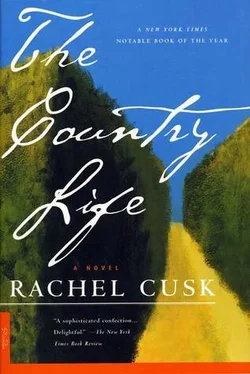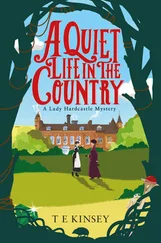He said this as if he meant it; and I saw, somewhat to my dismay, that he had taken my compliment as an ironical joke; and, what’s more, found it amusing.
‘Stella,’ said Martin abruptly. ‘Stel- la. Stella .’
‘Yes?’ I said, trying to sound encouraging, although I was somewhat confused.
‘Will you open the windows, Stel- la ? It’s got rather pongy in here.’
He said this last comment in a mock-aristocratic voice. I got up, keen for something to do, and threw up first one sash and then the other. The drive below lay deserted in the heat. A faint, warm breeze drifted in.
‘Are you happy, Stel- la ?’ he said, when had I sat down again.
‘I see no need to continue pronouncing my name in that way,’ I replied. I was taken aback by his question, and wondered what mischief he meant by it.
‘Are you?’ he repeated.
‘I suppose so,’ I said, settling back in my chair. I was surprised to feel myself on the brink of quite a lengthy reply. ‘How would one ever know? I’m as happy as anyone should be, living in a civilized country with no real disadvantages; but whether I am as happy as I could be, I see no way of finding out. I don’t happen to think that happiness is the be-all and end-all of everything.’
‘Then what is?’ said Martin.
‘Oh, I don’t know. Coming to an accommodation with oneself, I suppose. Not injuring others. Living a good life. Why ask me?’
‘Well,’ said Martin, putting his large hands on the wheels of his chair and rocking back and forth. ‘You did say that you thought happiness wasn’t that important. It’s an unusual thing to say, Stel -la .’
‘I didn’t say that I thought happiness was unimportant. Merely that it wasn’t the most important thing. I happen to believe that the search for happiness is often itself the greatest cause of unhappiness.’
‘But if you were happy, you wouldn’t be searching,’ said Martin.
‘I didn’t say I was. I was speaking generally. I think it is almost impossible to be happy and to know yourself to be so at one and the same time. People believe that happiness is a goal, as opposed merely to the absence of problems. Looking for happiness is like looking for love. How do you know when you’ve found it?’
‘I always imagined they came together,’ said Martin.
‘Nonsense. Love makes people more miserable than anything else.’
‘Have you been made miserable by love, poor Stel-la?’
‘That’s none of your business.’
‘Oh, go on.’ He smiled, and began to rock himself a little faster. ‘I won’t tell anyone.’
‘I should hope not. No.’
‘Tell,’ he said. ‘Tel-la, Stel-la. Tel-la, Stel-la.’ He rocked himself to the rhythm of the words. ‘Tel-la me-a Stel-la.’
‘Stop that immediately,’ I said.
‘Only if you tel-la me-a—’
‘I will not be blackmailed. Please behave yourself.’
At this moment the door flew open, and Mrs Barker, incandescent with sanitary fury, appeared upon the threshold.
‘Getting the better of her, are you?’ she said, grinning, to Martin.
‘Get-ta the bet-ta of Stel-la,’ chanted Martin.
‘I’ll need you both out,’ commanded the hag. ‘I’ve got to set this pigsty to rights. Go on, off with you.’
‘Keep your hair on, Mrs Barker,’ said Martin, while I boiled with anger beside him at the woman’s imperious manner. ‘Don’t get those elephantine bloomers of yours in a twist.’
‘You watch your lip,’ said Mrs Barker mildly. She positioned herself beside the open door and extended an arm towards the corridor. ‘Out.’
Martin rolled dutifully towards the door and I followed. As we passed the bulk of Mrs Barker, he looked up at her and made several loud kissing noises. I kept my head down until we were on the landing. We paused at the precipice of the stairs, and I remembered Martin’s disability; a fact which made me feel ashamed for the severity with which I had spoken to him just now.
‘Shall I help you down?’ I said solicitously.
‘Don’t be a vache ,’ said Martin. ‘Just carry the chair.’
Not being in a position — considering my earlier assault on Mrs Barker — to reprimand him for his language, I said nothing. Martin pulled a lever by the wheels which locked them, and then, with a single, terrifying movement precipitated himself out of the seat and slithered to the ground. For a moment I feared that he had hurt himself, but almost immediately he began to rotate himself with crablike movements upon his long, tensile arms, his shrunken legs dragging on the carpet behind him. As soon as he was positioned facing down the stairs, he began with remarkable alacrity to descend them, twitching his hips and reaching forward with each arm in turn to fling first one immobile limb and then the other ahead of him.
‘Come on,’ he called.
I picked up the chair — which was not, contrary to Pamela’s assertion, particularly light — and began slowly to make my way down behind him. He sat waiting for me at the bottom in a kind of heap, and when I positioned the chair for him in the hall grabbed its handles and levered himself up, like someone emerging from a swimming pool. He disengaged the brake and spun off towards the front door, which he opened dextrously. He sailed through the doorway and then disappeared abruptly from view. Fearing that he had rolled down the front steps, I ran out after him, and to my surprise found him sitting leisurely in his chair on the hot gravel drive.
‘How did you get down?’ I said.
He pointed to the side of the steps, where I saw a small ramp I had not previously noticed.
‘Dumbo,’ he said.
‘There’s no need to be rude,’ I said, descending the front steps. ‘What shall we do now? Would you like to go for a walk?’
‘I can’t walk,’ he said.
I was beginning to weary of Martin’s confrontational style of behaviour. He seemed determined to obstruct me at every turn. Although no longer strictly afraid of him, his volatility made me nervous. I had no idea of what he might do at any given time.
‘You know what I mean,’ I said tersely. ‘You could show me around the grounds. By the time we come back, Mrs Barker will have finished.’
‘All right,’ he said, affably enough. ‘You’ll have to push me, though. My arms get tired on uneven surfaces.’
‘OK,’ I said. I put my hands on the handles of his chair. ‘Which way?’
‘Through there.’ He pointed to a path running from the right of the house into some trees.
We set off. The heat was very fierce at the front of the house and the burnt skin on my face ached. I was relieved when we made it to the trees, which I saw marked the beginning of a small wood. The wheelchair made quite heavy going over the rough path and I began to sweat and lose my breath.
‘What do you think of the show so far?’ he said from below, in a silly voice.
‘Excuse me?’
‘What-do-you-think-of-the-show-so-far,’ he repeated, this time in the synthesized, unmodulated tones of an automaton.
‘Oh, I see. Lovely. Verdant ,’ I hazarded.
‘Not this. I meant everything.’ We trundled over an uneven patch and he gripped the sides of his chair. ‘ Maman. Papa. Moi , even.’
‘I don’t really know yet. I haven’t been here long.’ I was surprised that he should want to know what I thought of him.
‘Oh, come on ,’ he said, tipping back his head so that he could see me, with a smile which suggested that he thought the gesture winning. ‘Don’t tell me that you haven’t already made up your mind down to the last detail. You must think something .’
His dwarfish appearance and leering mouth, particularly when seen from above, gave him the look of a sprite or ghoul; not wicked, exactly, but naughty and dedicated to disruption. I decided straight away not to tell him anything. His voice had that same imploring tone that he had used — vainly, I was glad to recall — to extract tales of past romantic disappointments; about which now he seemed to have quite forgotten.
Читать дальше












